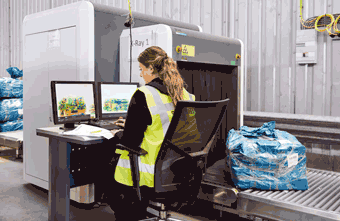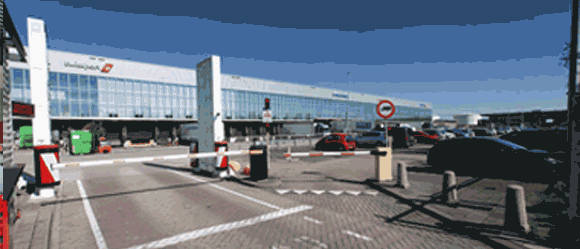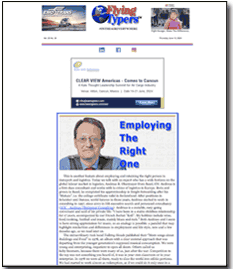

#INTHEAIREVERYWHERE
| |
 |
 #INTHEAIREVERYWHERE |
|
| Vol. 23 No. 31 | Monday
July 15,
2024 |
|
| |
Schiphol Why Not The Best? |
For many of our readers, infrastructure in transport and logistics falls among their own list of thought-provoking items. From my personal point of view, it is an increasingly important policy choice, in particular at this point in time, when a lot of the historical infrastructure in the USA and Europe needs updating if not an entire makeover, whilst other countries, e.g. China and India seem to make infrastructure central in their political choices. Be it when teaching our students or discussing the evolution of the sector at political level, infrastructure building, and ever more importantly its maintenance, is consequently fundamental and yet less prominent in the news than it ought to be. Laudably, the BBC recently released a wonderful podcast about the Baltimore incident and its consequences in the USA and elsewhere with regard to global traffic and trade. In a way the world discovered (not for the first time) that a single hit can shift our habits and cause the economy to plunge, severely hitting local and neighbouring communities. A couple of days ago I was discussing the situation with my students in Turin and I took note that, fortunately, they take infrastructure very seriously indeed. I remember talking about similar issues with friends and professionals last year at FIATA’s and TIACA’s congresses, both held in Brussels last autumn. Looking at this issue now, I was wondering whether there was something good in the material I brought home at the time. In my archives, I found the recording of my conversation with my Dutch friend Joost van Doesburg, who appeared at TIACA representing Schiphol, the well-known and rightfully celebrated Amsterdam airport in the Netherlands. Joost is Head of Cargo at Royal Schiphol Group and holds board positions at Cargo Information Network France and smartLOXS in the Netherlands. He has achieved a Master of Science degree in CSR at the university of Amsterdam. As we shall see in the following interview, Joost also gained considerable experience in advocacy in Brussels, where we first met and made acquaintances. Joost also devotes some of his time to the local political arena in the PvdA party. Our exchange was about air cargo and the importance of maintaining excellent infrastructure to emerge ahead of today’s fierce competition. It was about a wider concept of infrastructure, in a way both hardware and software, and we can see that one is not more important than the other in our dialogue. Both Joost and I had lived in Brussels for a certain time, and we are now both back to our respective countries of origin. I asked Joost to reflect on his past experience and bring it to light with regard to his present role as Head of Cargo in Schiphol. Joost started in the shippers’ environment, then moved to other areas and eventually to airports. He was happy to share his experience in approaching the different parties at play dealing with air cargo within the airport:
“You said that we both lived and worked in Brussels, you for CLECAT, myself for the European Shippers Council. I was very young, at the start of my career. It was my first job. Figure it out: my first job was in Brussels, whilst you were getting toward the end of your career! But we were both good. Not only was I working for the European Shippers Council, I also worked for the Dutch Shippers Council. And for them I really met the people who were working in the aviation industry, those who are sending the shipments round the world: pharmaceutical, high-tech shipments, companies like ASML, Philips, MSDA, etc. When I returned, the one thing which really struck me was the distance between real life and what the Brussels milieu was talking about. I wondered: ‘does Brussels know in fact what is happening in real life, in real business, in real transport challenges?’ You had had a practitioner’s role for decades, but I was at the beginning of my learning curve. “I still remember the discussions we had at the time: the known consignor/regulated agent policies, how to secure the supply chain in air cargo, etc. It was difficult, but constructive. The time in Brussels served as a preparation, ushering me into a new industry. I saw that those who work in aviation and the civil servants who were working in the European Commission really did not have much in common or even a clue on what the supply chain looked like: difficult to imagine the journey from consignor to consignee, who was dealing with the cargo in subsequent steps and the different parts of the supply chain that comprise so many different companies. So many different activities were happening before the goods were loaded into an airplane. It takes a lot of organisation and solid investments in infrastructure, both physical and digital.
“We are talking about air cargo, but in the end cargo is in the air for much less than on the ground . . . Perhaps you should not even call it air cargo, because it is only 12/15 hours in the air and from door to door it will take you five days sometimes . . . ” At that point I observed that the real supply chain is not such an easy thing to understand, actually a pretty complicated concept to grasp, so I could understand that if one was not involved in it directly, it would be difficult to appreciate, for a civil servant, too. Joost said he remembered the very big discussion when security was on the tables. That was a good example why it is so important to have a good representation within Brussels, in the Brussels “arena”. He continued: “Of course when I started on the shippers’ side it was the European Shippers’ Council working together with CLECAT, IATA and TIACA in those days; when I was working for the Dutch Airline Pilot Association we were dealing with the European Cockpit Association and now of course we have ACI, who are representing the interests from the airport’s point of view: there you need to conciliate Asia, America, Europe etc. even if you want to have it a little bit different . . . ”  I asked Joost how comfortable was he working
within the ACI. I wanted to know whether he considered Schiphol sufficiently
proactive regarding ICAO, ACI and the EU institutions or would he prefer
a more active role to present. Joost replied: “ACI is of course a
real powerhouse in representing airports and they really do it at the highest
level, but when I started office in March 2023 I asked my colleagues here
at Schiphol: ‘when do I meet my colleagues from the other European
airports?’ Sometimes you will meet them at air cargo events, but not
on a regular basis, so I approached my Frankfurt colleague Max and my London
Heathrow colleague James and I said: ‘shall we set up a cargo working
group within ACI?' Well, we did: so one of the results is that we created
together the ACI informal cargo working group under the ACI umbrella, because
a lot of challenges were being discussed like cyber security, as well as
security in aviation, sustainability, etc. but not from a cargo perspective
and everybody knows that cargo is really something different than the main
activities at the airport, which are mainly focused on passengers. Many
airports really see cargo as a by-product of the passenger industry. Of
course, without really capturing the attention it deserves . . . You should
really think cargo from an airport perspective as one of the most important
topics that you have on your tarmac. You have passengers, but you also have,
cargo activities. And you should give it all your attention.”
I asked Joost how comfortable was he working
within the ACI. I wanted to know whether he considered Schiphol sufficiently
proactive regarding ICAO, ACI and the EU institutions or would he prefer
a more active role to present. Joost replied: “ACI is of course a
real powerhouse in representing airports and they really do it at the highest
level, but when I started office in March 2023 I asked my colleagues here
at Schiphol: ‘when do I meet my colleagues from the other European
airports?’ Sometimes you will meet them at air cargo events, but not
on a regular basis, so I approached my Frankfurt colleague Max and my London
Heathrow colleague James and I said: ‘shall we set up a cargo working
group within ACI?' Well, we did: so one of the results is that we created
together the ACI informal cargo working group under the ACI umbrella, because
a lot of challenges were being discussed like cyber security, as well as
security in aviation, sustainability, etc. but not from a cargo perspective
and everybody knows that cargo is really something different than the main
activities at the airport, which are mainly focused on passengers. Many
airports really see cargo as a by-product of the passenger industry. Of
course, without really capturing the attention it deserves . . . You should
really think cargo from an airport perspective as one of the most important
topics that you have on your tarmac. You have passengers, but you also have,
cargo activities. And you should give it all your attention.”
I then challenged my Dutch friend a bit: “You are now Head of Cargo at Schiphol, one of the leading airports in the world, an airport that has always been considered a temple of efficiency. Is this a correct perception, or would you identify some areas where improvement can be made? Schiphol has reached a good balance, hasn’t it? No way to take Joost off guard: “When you look to traditional cargo, we are in the end number two in Europe. When you also take e-commerce within the scope, we are the fourth biggest cargo hub. We have a great network with KLM and its partners, actually based on belly-hold. But we also have the majority of our cargo, i.e. more than 50% of our cargo is being shipped in full freighters. So full freighters and that type of services are really important for our proposition to be profitable as an airport, but also as a service to our Dutch community. Because 25% of the economic benefits generated by the airport for the Netherlands is based on cargo, our biggest companies in the Netherlands, the biggest company being ASML, enjoy a prime service. They do not sell any product within the Netherlands, they only export their products, and they export it by air. So if you want to stimulate your high tech, high level production facilities from an economic perspective, you are also talking about air cargo, because these are the typical goods that are being transported by air to the rest of the world.” I contended that this picture could be different in other areas: There are many airports which tell us that the numbers in freighters are getting lower and lower, and they do not see freighters being very important in the future. No idea whether they are right or not . . . Joost agreed: “In the end, that is also a development that is happening in the Netherlands. The development is . . . – (there was a pause to reflect) – well, we are now full! If you are an airline and you are not flying to Schiphol already, it is really difficult to give you a slot. There are also political discussions on if and how can Schiphol Airport grow, or even: do we need to pass up on a certain numbers of flights? You know, if an airline needs to choose between a passenger plane or full freighter: with a passenger plane you can make much more profit. And a big triple seven with 300 passengers on board can still carry more than 15 tons of cargo. Still, this represents a small freighter . . . And so you will also see within Schiphol, because we are sold out, you will see a drop in the number of freighters. But the Dutch government and we as Schiphol, we really maintain cargo is important. Freighters are important and we really need to defend the numbers of freighters that we have in our airport: we do not want them to disappear. We want to keep them at a certain healthy level.” I observed that keeping a balance of the different resources is good in whatever you do, and also for airports . . . Then I asked a couple of technical questions: Security in the airport is today fait accompli: nobody could imagine an airport without top-notch security measures. Is this something that has been completely digested in AMS? Are there any efficiencies that have been discovered in the necessary security measures that all parties have adopted, speaking of modern cargo handling also in terms of information and data exchange? Can you describe the community environment in Schiphol and how well you work with airlines, handlers and logistics service providers? Some freight forwarders particularly pride themselves in “bridging the gap”, irrespective of the level of automation, is this a correct approach in your view? Joost replied pensively: “Let us start by taking a look at the corona pandemic. Every country, every airport, every society could have learned that air cargo is really important, that passenger planes stop flying during a pandemic, but we still need the personal protection materials and we still need the vaccines. And who will bring it to you or to other countries? Air cargo makes it happen, period. The flow was constant in Schiphol even during the pandemic. But this does not mean that we have nothing to improve at Schiphol because we are a really solid airport. But when you stop developing, you will go down eventually, you will walk behind others. So two years ago we have purchased, Cargonaut, our port community system and why did we do it? Because data and data quality are paramount and many services are really based on information. That is the reason why the airport purchased the port community system. Now it is owned by the airport, and we completely renewed it to really make it ready for IATA ONE Record and XML, in order to make sure that we can really service the Dutch cargo community from a data point of view, and that we can also start new services.  “You
asked me what kind of challenges we are facing . . . well, one of the main
challenges we had in the last couple of years was to make landside access
more reliable. Let’s face it: what do all the shippers do and what
do all the freight forwarders do on Friday? Friday is still exports day
and on Friday all shippers have their shipments ready and forwarders collect
the cargo and will bring it right away to the handling company . . . with
one result: a lot of traffic jams, a lot of angry truck drivers and overworked
staff in the handling companies. Huge traffic jams mean unreliability, so
what we are now creating is a slot booking system for trucks visiting our
airport, where our five different handling companies can say: ‘okay,
we can only cope with this amount of trucks, they will give out the slots
via our port community system, etc.’ So via Cargonaut we are making
landside access much more reliable. Of course, as a freight forwarder or
trucking company, you are no longer free to visit our airport when you want.
But in return, we will give you a much more reliable solution and spread
out the trucks, for example, from Fridays to the rest of the week days.” “You
asked me what kind of challenges we are facing . . . well, one of the main
challenges we had in the last couple of years was to make landside access
more reliable. Let’s face it: what do all the shippers do and what
do all the freight forwarders do on Friday? Friday is still exports day
and on Friday all shippers have their shipments ready and forwarders collect
the cargo and will bring it right away to the handling company . . . with
one result: a lot of traffic jams, a lot of angry truck drivers and overworked
staff in the handling companies. Huge traffic jams mean unreliability, so
what we are now creating is a slot booking system for trucks visiting our
airport, where our five different handling companies can say: ‘okay,
we can only cope with this amount of trucks, they will give out the slots
via our port community system, etc.’ So via Cargonaut we are making
landside access much more reliable. Of course, as a freight forwarder or
trucking company, you are no longer free to visit our airport when you want.
But in return, we will give you a much more reliable solution and spread
out the trucks, for example, from Fridays to the rest of the week days.”I concurred: Every freight forwarder complains that the Friday rush creates a lot of trouble. The problem is, and your background on the shippers’ side should assist, that even freight forwarders are not the culprit, it is quite difficult to find the first one to blame. But generally, if you have a customer who tells you the goods will be ready on Friday at half past three in the afternoon, or even at half past four, thank you. If you have five clients, that happens for five clients. Difficult to tell your five clients: ‘excuse me, but we have only two trucks, and that means that two trucks will serve two clients. The other three clients cannot be serviced at that time.’ What are we going to do with the others? It has always been the same battle . . . When I was a forwarder, I hated Fridays. In the best period of my working life, when I was a freight forwarder on demand, I was actually charging much more for pick-up on Friday. It was inevitable, it was costlier for us, too. We were working illegal hours . . . starting on Friday morning, until Saturday lunchtime non-stop. Can you imagine, all night long loading trucks through the night? People went home shattered. We stayed, we were young and crazy. The drivers were exhausted, so were we, but that was it, take it or leave it. I hope it is better today. We need to be more considerate from all points of view.
There are serious worries about climate change and we emerged from a rather controversial COP 28. The sea level will surely climb in future and little can be done now to avoid it, apparently. Joost, how does this alarm ring in the ears of Dutch people and in Schiphol in particular, considering its altitude above the sea level in your country? Joost replied that it was a great question, regarding sustainability and aviation: “Yes, we really see, from an airport point of view, that sustainability will only increase in importance. Every shipper, big industrial company, wants to comply with the COP 28 agreement and reduce their carbon footprint. As a result, we as an airport want to become a carbon neutral airport from the year 2030, to make sure that we do not have any local emissions anymore. So . . . no more diesel trucks running on airport sites. All our buildings will be carbon neutral to improve air quality, and in the end this will also mean that we should be really strict in the next coming years in expecting that more and more trucks are electrified.” I observed that from some point of view, it is true that we have to comply with more demanding regulations, but from another point of view this kind of innovation could actually make business sense. Some of these savings are not only savings on emissions, they are tangible savings on your spending: these are investments that are going to create better business. Joost concurred: “Everybody, all the trucking companies that already have electric trucks admit there are challenges. There are also huge benefits in relation to cost. Personally I purchased an electric car. When I see the increase in fuel costs at the gas station, for me it matters not. because my gas station is my home: I will plug in my car, and from the energy perspective it is much cheaper. There are challenges, but when you want to be the best . . . “At Schiphol we no longer have the goal to be the biggest in Europe. We cannot become the biggest cargo hub in Europe any more. We should be much stricter on what type of goods we are shipping: highest quality goods, high-tech, pharmaceuticals, etc. These have the biggest impact on our Dutch society. Maybe the volumes will go down at Schiphol Airport, but we want to maintain, or even increase, the added value for our Dutch economy, and the value of the goods that we are importing and exporting. In that way, when you want to become the best, you also want to work with the best partners, the most sustainable, reliable, those offering the best service to their customers. From the volume perspective, we at Schiphol cannot make the difference anymore. Liège will become cheaper, there are more possibilities at Liège, but we can make the difference with regard to quality. We should really, as an airport, see our biggest goal, becoming the best cargo hub, instead of being the biggest.” This sounded like a call for my next point. From a technical point of view Schiphol is a rather complex airport, with intersecting runaways and one single terminal concept, albeit with some special arrangements. I imagine this approach was due to the evident lack of space that has been a limitation for the Netherlands historically, but I shall be glad to stand corrected if you disagree. What consequences does the situation have on cargo handling in general and in your own work in particular? Schiphol has been conceived – particularly interesting from my point of view – with respect for the landscape. How does it work from that point of view? I think it was a considerate infrastructure building attempt, do you agree? Joost took the challenge and said: “We, as an airport, were built with an old philosophy, to create several runways, in several directions. And that was our biggest advantage in the past. Now we need to be as innovative in the future, providing new solutions. And that is why we have purchased our new airport community system. An airport should become, in the future, much more than physical infrastructure, an IT company, a high-tech company, not a company which provides a runway. So, we make data fly, instead of airplanes. When I was working in Brussels, they took me to the handling companies: you had the pallets being built-up and broken-down: they always said, ‘here, fill on top’. And they picked a big bundle of papers, which should stay on top of it all. ‘Else, we have a big problem. Elvin, spin it!’ The pile of paper is now gone. Now the information is digitalized. It is travelling beside the physical cargo, but in future the information needs to be there much earlier, to reduce waiting time for customers, to reduce waiting time for the veterinary inspections and other government agencies, to give them all the time they need to make their inspections based on the paperwork. We want to be an airport where the information has a much higher quality and our logistics services also have a much higher quality, so that also shippers that are sending the most expensive goods, the most vulnerable cargo, also in relation to theft, even those customers can say that they are choosing Gateway Schiphol because, perhaps not the cheapest, it is the best!”
I observed that Schiphol was moving upward in the market to try to keep its competitive edge on the rest. Joost agreed: “For the next 10 to 20 years, volumes will go down, probably also the number of freighters, but we will always have much more freighters than at Heathrow, for example. But what is really important is that the quality will increase. And the big difference we can now make as an airport is working together with the community. Look where their challenges are, where the shippers, the freight forwarders, the handling companies, the trucking companies are and really work together, because we are a country that is based on the polar model and working together to provide our cargo community the best solutions is our mission.” I then tried a comparison: “Air France-KLM is said to have developed a special interest in Scandinavia? Do you have, as Schiphol, any kind of appetite or project or anything like that in finding subsidiaries in other countries that are controlled by Schiphol? Like, you know, for instance, Swissport have this kind of approach where they actually become the handling company for airports outside Switzerland. Do you have a similar approach?” “Schiphol is now working with five different cargo handlers: we have Swissport, Menzies, Dnata, WFS and KLM Cargo, but we are expanding as an airport group. We have Brisbane and Hobart in Australia and a terminal at John F. Kennedy in NYC. We own Eindhoven and Lelystad airports in the Netherlands and we recently purchased 40% of Maastricht-Aachen in the south of the Netherlands. All are working as subsidiaries for us, and we are really also promoting them. For example, for flowers’ flights from Africa you can see this as one airport. We are expanding, becoming bigger, but really mainly serving the Netherlands. But Maastricht is the second cargo airport in the Netherlands, very closely located to Liège and we are really offering our knowledge, offering our support community system to Maastricht-Aachen Airport too, to make sure that they have also a much better proposition.” I added a last one: “Any development in Southern Europe and South America? Because there are a lot of flowers in South America . . . ” “Not that I am aware of. Definitely, not that I am aware of. We have some strategic partnerships with airports abroad, but not that I am aware of other developments.” Laconically replying to this Joost and I promised to keep in touch and continue our conversations in future. An invitation to visit Italy followed in due course and I hope someday Joost will want to take it. Maybe he could impress our local air cargo environment, which could probably do a bit better in future than in the past, surely not impossible. One thing is very clear in all that Joost van Doesburg pronounced in the interview above: there is a constant search for better, better, better results. This is so deeply rooted that it sounds as a religion. I wish many of us were taking this mantra home, everyone knows where home is, right? Then do it, please! Marco L. Sorgetti |
If
You Missed Any Of The Previous 3 Issues Of FlyingTypers Access complete issue by clicking on issue icon or Access specific articles by clicking on article title |
||
 Vol. 23 No. 28 Employing The Right One Ingo Zimmer Celebrates 35 Years Super Summer On The Wild Side Peter Sedgley One Of A Kind |
 Vol. 23 No. 29 From CLEAR VIEW You Can See Forever Chuckles For June 24, 2024 |
|
Publisher-Geoffrey Arend • Managing
Editor-Flossie Arend • Editor Emeritus-Richard Malkin |
Send comments and news to geoffrey@aircargonews.com
|